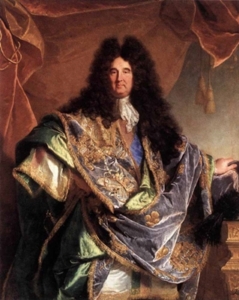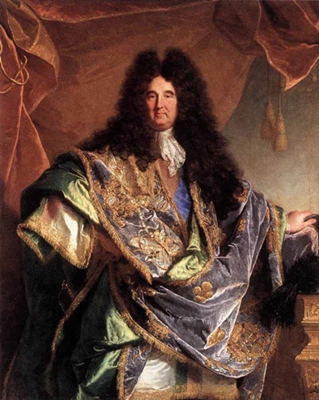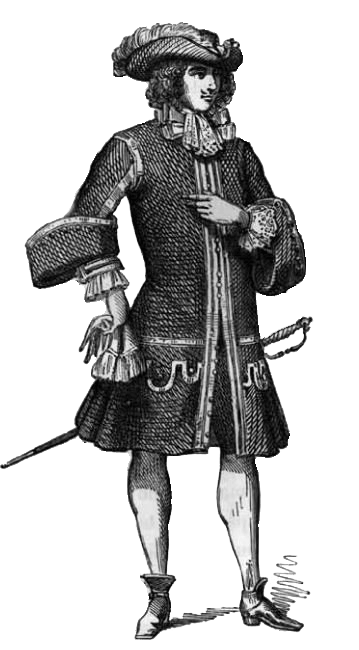Dangeau’s Diary, September 1690

6th. —Monseigneur has been reconnoitring on the right, left, and in front of his camp along the river Eltz, as far as the borders of the Rhine. Our right can no longer now be annoyed by a small height beyond Eltz, on which the enemy might have placed some cannon. Today, we have been foraging in Emmeting and tomorrow Monseigneur sends the Comte d’Auvergne into that country to lay it waste, in order to prevent the enemy’s finding subsistence there should they approach it. We have established posts between here and Brisac to facilitate our convoys.
7th. — Monseigneur left his quarters this morning at nine in the morning and did not return till eleven at night. He left by the Fribourg road and reentered by that of Brisac. He visited all the heights which are between these two places and on his return, traversed a very deep morass; this occasioned his late arrival.
13th. – As it is supposed that the enemy wish to pass in our rear, in order to arrive before us in the countries which have not yet been foraged, and as we perceive plainly they have no intention of attacking us, Monseigneur has caused the army to march to day in three columns; the infantry in the middle, our right wing making the left-hand column, and our left the right. Monseigneur, before quitting the plain de Val, visited all the columns and previous to setting off, withdrew the infantry which was at Kentzingen. None of the enemy’s troops have appeared and we have learnt upon the march, from some prisoners made by a Lieutenant of the free companies of Alsace, that they are still in the passes of Lohr and have no idea of attacking us. These prisoners say that they are very much straitened; that the peasantry have killed more than a thousand of their foragers and that the Elector of Saxony is continually threatening to quit them, saying that he does not wish his army to perish from want amid rugged mountains and bad roads.
The King has sent a courier to Monseigneur and informs him that he must proceed to Marly; he also desires him to send off extraordinary couriers every day, even if he has nothing to communicate.
14th. – Monseigneur, on quitting Akare , proceeded to Brisac. He made the tour of the old town and alighted at the foot of a bastion to view a new sluice, the only work of consequence since the court has been at Brisac. Yesterday, upon leaving Endingen, a fire broke out at Monsieur de Vendôme’s: it burnt several houses and Monseigneur caused money to be given today to Monsieur de la Grange, the intendant of Alsace, to be distributed among those whose houses have been burnt.
17th. — A vessel from Canada arrived at La Rochelle, brings the intelligence that our colonies are in want of prompt assistance. The mission of the Bishop of Quebec has penetrated into places which would have been considered heretofore as imaginary. He says, that he has found a people, whose hair of the head and body resembles the plumage of parrots; and that he has discovered another, where all the males are humpbacked and all the women lame of one leg.
18th. — The couriers, who daily set off from here for the court, are forbidden to take the letters of any individual. Letters must, in future, be sent by the usual conveyance.
23rd. – An envoy from the Swiss who resides with the Bishop of Bâle has arrived to beg Monseigneur not to forage the villages belonging to Monsieur de Porentru, and Monseigneur would have granted his request, had he not received orders from the King to the contrary, just before the envoy entered; but in order that no excesses may take place, nor pillage be committed, Monseigneur has dispatched officers there this evening, to see that the peasantry place the forage, etc. outside the villages and that the foraging party does not enter. Marshal de Lorges assured the envoy, that it was necessity alone which obliged them to it, as the army could find nothing to subsist upon here. This envoy is not sent expressly by the cantons, nor is he accredited to Monseigneur, but being the Swiss resident with Monsieur de Porentru, he thought proper to take this step.
25th. — The envoy of the Swiss, who is here, has begged Monseigneur to allow an escort to be given to the peasantry, whose villages have been foraged; they ask permission to pass the Rhine, carrying with them their furniture and cattle. Monseigneur will appoint them an escort tomorrow, that they may pass the Rhine in safety.
29th.— The Comte de Grammont has set off post, to inform the King that Monseigneur will arrive at Fontainebleau on Sunday. The King will be there on Thursday.
30th. — After dinner, Monseigneur set off from the army, leaving it under the command of Marshal Lorges: he has come to pass the night here, where the Marquisses d’Uxelles and Chamlai have arrived to conduct him. Monseigneur has passed the Rhine over the bridge at Neubourg. The Marshal de Lorges accompanied him for a league beyond the bridge and then Monseigneur sent him back with all the other officers. He has only permitted Messieurs Villequier, Mailly, and d’Antin to follow him as far as Brisac.

